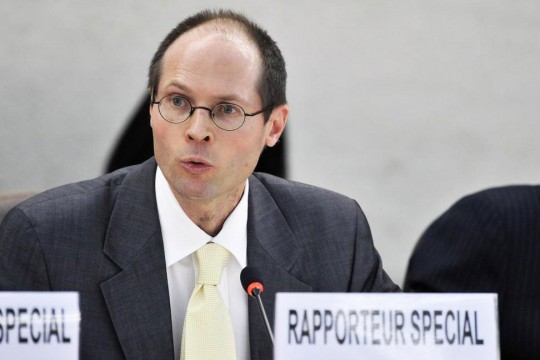UN expert urges leaders at G-20 summit to put right to food before industry interests
UN expert urges leaders at G-20 summit to put right to food before industry interests
31 October 2011
“The G-20 made an important statement of intent by placing food security at the top of its agenda. But agreeing on a food security action plan without addressing biofuels and speculation would be like running a bath without putting in the plug. All of the good ideas simply drain away,” said Olivier De Schutter, UN Special Rapporteur on the right to food, in a statement.
Mr. De Schutter called for governments to put an end to biofuel mandates and subsidies as they are a major factor that causes food prices to rise and creates a high demand for farmland in developing countries.
“Leaders are yet to prove that they heard the joint recommendations of international organizations five months ago, which urged G-20 governments to stop subsidising biofuels. It is not enough to name-check the issue – the G-20 must put the human right to food before the vested interests of some of its industries,” he said.
Mr. De Schutter also called for leaders to put financial regulations in place to stop speculation on food commodity prices, making them rise unnecessarily, and said the action plan agreed by G-20 agriculture ministers in June is too weak and requires a stronger stance to have an impact.
“Food commodity markets must not be a refuge when other financial markets have dried up. Speculation on these markets is rife, and instead of allowing producers and buyers to hedge against risk, it has increased risk and led to price changes unconnected to the underlying fundamentals.”
In addition, Mr. De Schutter said food reserves can be used to stimulate the growth of small farmers, prevent famines, and bring stability to the food market.
“We must be more ambitious, and use food stocks as a tool for stabilizing the market. If we buy from small-scale farmers when supply is plentiful, and release these stocks when markets are tight, we can prevent the volatile price swings and supply shocks which create humanitarian crises in the first place.”
The expert warned that unless bolder actions are taken, the world will be unable to feed the nine billion people estimated to inhabit the planet by the year 2050.
“Time is running out for world leaders, who must go beyond rhetoric and deliver real change. The hungry cannot wait,” he said.
###
> United Nations (UN).
 The United Nations was established on 24 October 1945 by 51 countries committed to preserving peace through international cooperation and collective security. Today, nearly every nation in the world belongs to the UN: membership totals 192 countries.
The United Nations was established on 24 October 1945 by 51 countries committed to preserving peace through international cooperation and collective security. Today, nearly every nation in the world belongs to the UN: membership totals 192 countries.
When States become Members of the United Nations, they agree to accept the obligations of the UN Charter, an international treaty that sets out basic principles of international relations. According to the Charter, the UN has four purposes:
- to maintain international peace and security;
- to develop friendly relations among nations;
- to cooperate in solving international problems and in promoting respect for human rights;
- and to be a centre for harmonizing the actions of nations.
###
* The above story is adapted from materials provided by United Nations (UN)
** More information at United Nations (UN)





















